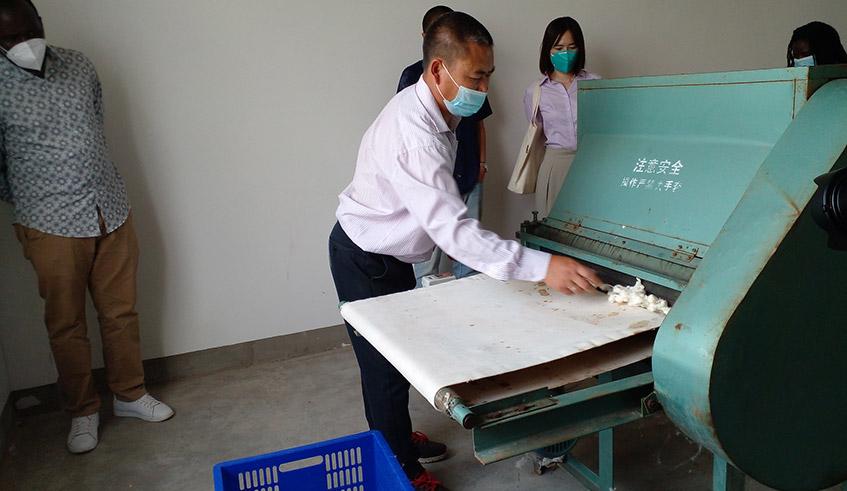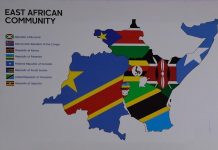Africa-Press – Rwanda. In November this year, China and Rwanda will be celebrating 50 years of diplomatic ties. The two countries established diplomatic relations in 1971, giving rise to a number of partnerships in various fields, one of which is agriculture.
As part of this, China and Rwanda jointly run the China-Rwanda Agriculture Technology Demonstration Center (C-RATDC), one of 14 demonstration centers of China agricultural technology that the People’s Republic of China decided to put in place, as a result of China-Africa Cooperation Forum summit held in Beijing in 2006.
Located in Rubona in Huye District of Southern Province, the project occupies an area of 22 hectares of land, and comprises facilities for juncao technology for mushroom growing, paddy rice farming, water conservation and sericulture-related technologies.
In the project, Rwandans partner with Chinese experts to train farmers, facilitate research among other aspects. It has held more than 57 training courses on paddy tice, upland rice technology, juncao technology, soil and water conservation and sericulture technology.
The project promotes 6 rice varieties and 3 upland rice varieties;12 edible mushroom species and 5 grass species. The most impactful part of the project is juncao technology, a Chinese mushroom cultivation technique that has benefited many farmers in Rwanda.
Juncao is a Chinese word meaning the use of herbaceous plants as the culture substrate for cultivation of edible and medicinal mushrooms. It was invented in 1983 by a Lin Zhanxi, a Chinese Professor.
In Rwanda, this technology is the most developed component of the C-RATDC. It has been promoted to more than 3,800 farmers, and more than 50 companies and set-employed individuals have been supported in the production of juncao mushroom substrate bags.
Ernest Ndayizeye, one of the farmers that have benefited from Juncao technology has a great story about how it has impacted his life, as he now owns a business worth about Rwf20 million.
He graduated from the University of Rwanda’s Biotechnology Department, and after he secured an internship at the Rwanda Agriculture Board (RAB). Later, he linked up with the C-RATDC, working with them as an intern.
Here, he got an opportunity to travel to China to study juncao technology. “After the studies, I came back to Rwanda and got employed by the Chinese. After two years of working with them, I started my own business,” he says.
Currently, he has spent two years working as a businessman, producing juncao mushroom substrate bags to be bought by farmers, in addition to being a farmer himself.
“My business started slowly because I didn’t have a lot of capital, but it has been growing. I started with a capital of about Rwf 200,000, making about 300 substrate bags. But right now, I make up to 5,000 bags, and I have a capital of Rwf 5 million,” he says.
Altogether, he notes that his business is worth about Rwf 20 million. He employs five workers, and has bigger dreams of expanding his work. “Currently, much of my market is in Kigali, but I have a plan of expanding my business to Rusizi district, so that I can tap into the Congolese market,” he says.
Canan Enani, another farmer based in Huye district also has a story of how juncao technology is beneficial to farmers. He started investing into the business using a capital of Rwf 20 million which he had borrowed from the Development Bank of Rwanda (BRD), but currently, his business is worth up to Rwf 50 million.
Like Ndayizeye, Enani produces juncao substrate for sale to farmers, but he too is involved in cultivating mushrooms. “It is a good business and has good market. I think farmers need to learn more about how impactful mushroom growing can be,” he says.
The C-RTADC aims at being an economically viable, cohesive and sustainable diversified demonstration centre which is highly using good agricultural practices to produce high quality rice seeds, mushrooms varieties, land husbandry and new cocoon eggs varieties to improve farmers’ livelihoods and insure food security in Rwanda.
It has a mission of developing market oriented agriculture through appropriate agricultural technologies enabling farmers to increase their income, access job creation and business opportunities.
The center has conducted 48 training courses on Juncao mushroom technology with more than 1879 participants including the farmers grouped into cooperatives and
individual farmers, agriculture technicians, agronomists, university students, and health counsellors. Most of the training courses are held at C-RATDC headquarter, but sometimes the Chinese experts join the farmers at their respective villages to train them in collaboration with Rwanda Development Board.
The main subjects for mushroom training encompass the whole process of seeds production for cultivation and mushroom growing technology. The trainees are acquainted especially with theoretical and practical skills on: Juncao grasses planting, grinding, mixing and substrates packaging, sterilization, inoculation and mycelium management, mushroom shed construction, planting and fruit body management, mushroom harvesting and processing, mushroom nutrition value and mushroom cooking, and mushroom diseases and insects control.
The project is also involved in experimentation to find some new mushroom varieties that are suitable for cultivation in Rwanda climate condition. Researches are also being carried out on natural wild mushroom in Rwanda to find out whether they can be cultivated artificially. For instance, Ganoderma was collected from Rwanda’s natural forests, and the experimentations and cultivation trials carried out successfully for growing it. What remains is to conduct a study on its biological and pharmacological properties.
Rice growing
Rice growing is another part of the project. The center has held 7 training courses on rice cultivation and completed by 189 trainees including rice farmers and technicians.
The training courses cover subjects including rice nursery technology, field preparation, seedling planting and broadcasting technology, water and fertilizer management, diseases and insects control, harvesting techniques and use of machinery. The training is on both paddy rice and upland rice cultivation, but more emphasis is put on
paddy rice cultivation.
The farmers are also taught new cultivation technologies which should assist them to move from traditional rice farming to modern farming and then increase their yield. Laurent Nizeye, one of the farmers working with the project says the benefits are not only in training, but also in the financial part of things.
Here, he says they are aided in their farming, as the Chinese give them advice, but also buy the rice from them at a price that is higher than the ordinary market price. Besides the rice and mushrooms projects, the center has set up a 5000 m2 demonstration are for soil and water conservation.






